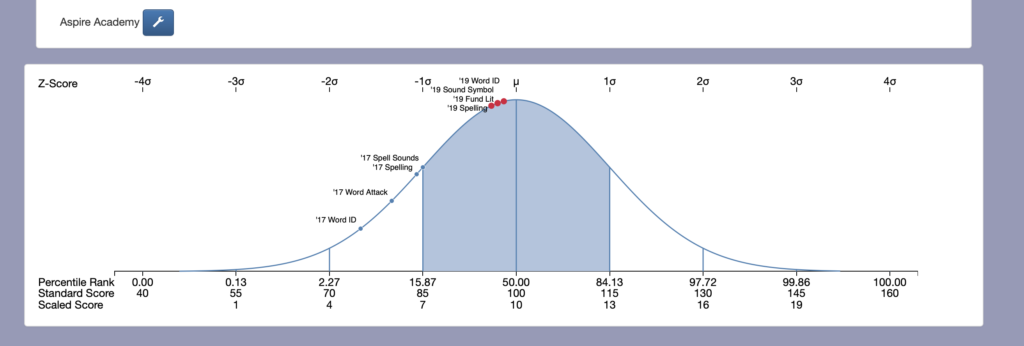Tutoring Results
Measuring Student Growth
The most reliable way to measure student growth is to use standardized tests that measure the performance of thousands of students within a defined age range. At Aspire Academy, we use standardized testing to measure students before they begin tutoring at Aspire Academy, midway through the program, and at the program’s end.
We plot these results on a bell curve. A bell curve is a graph depicting the normal distribution, which has a shape reminiscent of a bell. The top of the curve shows the mean of the data collected.
Students at grade level reading will have standard scores of around 100 near the top of the bell curve.
Most students at Aspire Academy score below the standard score of 85, and they are reading in the bottom 30th percentile of their peers before they begin the program
In David Kilpatrick’s book, The Essentials of Assessing, Preventing and Overcoming Reading Difficulties, p. 13, he states that the most commonly used programs to remediate struggling kids in schools (READ 180 and Reading Recovery) display improvements of 3-5 standard points on measures of Word Attack and Word Identification.
Children remediated with phonemic awareness and systematic phonics programs have improvements of 10-20 standard points in these areas. This is what we typically see at Aspire Academy with our students when they are about 50% of the way through the program. We use the Orton-Gillingham method to remediate children’s reading. This is the leading reading method that uses phonemic awareness and systematic phonics.
Aspire Student / Reading growth from 2nd-4th grade using the Wilson Program.

2nd-grade Aspire Academy student
Word ID: 2019 Standard Score: 98
Word ID: 2017 Standard Score: 75
Growth: 23 standard points
Aspire Student / Reading growth from 7th to 9th grade using the Wilson Program.

This student began at Aspire Academy in 7th grade. His progress was measured before he started the program, midway through the program, and then at the end of the program when he was in 9th grade. He tutored two hours per week for approximately 24 months. He was reading above grade level at the end of the program.
Fundamental Literacy 2019: 111
Fundamental Literacy 2018: 93
Fundamental Literacy 2017: 74
Total Growth: 37 standard points
3rd Grade Student – Reading Growth over
15 months tutoring 2 hours/week using the Wilson Program.
Word ID 2019: 79
Word ID 2018: 55
Total Growth: 24 standard points
6th-grade student reading at first-grade level: Program Growth over 27 months using the Wilson Program
The student above was in 6th grade reading at a first-grade level when they started at Aspire based on standardized testing. When this student finished the Wilson program, they made 84 months of growth in passage comprehension and 60 months of growth in Word ID. He ended the program reading at the 7th-grade level. This student attended Aspire Academy three days a week for 27 months.
Word ID 2019: 94
Word ID 2017: 57
Total Growth: 37 standard points
6th-grade student – Reading Growth after 20 months using the Wilson Program
Word ID 2018: 89
Word ID 2017: 58
Growth: 31 standard points
Fundamental Literacy 2018: 95
Fundamental Literacy 2017: 76
Growth: 19 standard points
Sound to Symbol 2018: 119
Sound to Symbol 2017: 65
Growth: 54 standard points
2nd Grade Student after 2 years of tutoring
This student started the Wilson program at the beginning of second grade. Two years later, he was 75% of the way through the program and reading above grade level on all measures.
Word ID 2019: 104
Word ID 2017: 54
Growth: 50 standard points
Fundamental Literacy 2019: 100
Fundamental Literacy 2017: 61
Growth: 39 standard points
Aspire Academy cannot promise these results, but we can show that we typically see these results as noted above. Children’s results in the program depend upon the severity of their dyslexia. Children with very low working memory scores, very low visual attention scores and very low processing speed scores can take longer to improve.
